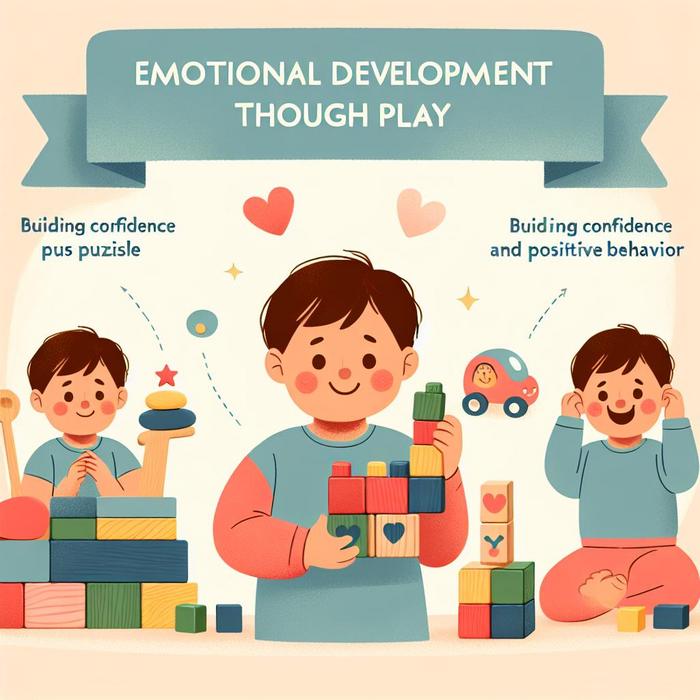The Role of Play in Our Baby’s Emotional Development: Strategies We Use
Understanding the Emotional Development Through Play
Engaging a baby in play isn’t just about fun and games. According to developmental experts, play forms a vital part of a child’s emotional development. The complex process of building confidence, learning about relationships, and understanding the world, starts with something as simple and beautiful as play. A report from the American Psychological Association suggests that the right play activities can aid emotional development in profound ways.
How Play Can Promote Positive Behavior in Babies
Many parents wonder how play can influence their child’s behavior. Here’s how:
- Play allows your baby to express their feelings and emotions openly. This helps them understand and manage their emotions better, leading to more positive behavior.
- Engaging activities during play periods provide an outlet for your baby’s energy, reducing negative behaviors like tantrums.
- Play establishes a positive parent-child bond, laying the groundwork for trust, respect, and cooperative behaviors.
- Shared play activities can teach your baby social skills like turn-taking and sharing, promoting positive behavior in social settings.
Strategies for Boosting Emotional Development Through Play
Now that we’ve unraveled the connection between play and emotional development, let’s delve into some strategies we’ve been using to facilitate our baby’s emotional growth through play.
1. Choosing Age-Appropriate Engaging Activities
We’re aware of the importance of age-appropriate play. As per Raising Children Network, babies at different stages interact in varied ways. So, we’ve been keen on choosing activities that align with our baby’s developmental stage. For the first few months, we focused on sensory plays like exploring textures. As our baby grew older, we’ve integrated more complex activities like problem-solving games.
2. Playtime as a Bonding Time
For us, playtime isn’t merely about keeping our baby entertained. It’s a precious period for bonding. Whether it’s through a game of peek-a-boo or a simple story session, we ensure that we’re physically and emotionally present for our baby.
3. Encouraging Autonomy and Building Confidence
We believe in the power of independent play in building confidence. While we supervise, we allow our baby the space to explore, make mistakes, and learn on their own. This has been effective in fostering self-confidence and independence.
4. Mindful of the Baby’s Cues
Our journey with our baby has taught us the importance of tuning into their cues and respecting their moods. Just like us, they have good and bad days. On days they seem less interested in play, we retreat, respecting their need for downtime.
Why Consistency Matters
Consistency is key to harnessing the benefits of play for emotional development. Regular playtimes establish a sense of security and predictability for a baby, promoting emotional wellbeing. Studies from Pediatrics affirm the importance of consistent playtime in fostering a baby’s emotional health.
5. Implementing Responsive Interactions
Having responsive interactions during play has proven beneficial. If our baby throws a ball, we make an effort to kick or pick it up. This responsive interaction instills a sense of cause and effect understanding in our baby, fostering emotional growth.
Promoting Social Skills through Play
Social skills are an integral part of a baby’s emotional development. Fortunately, play provides an opportune platform for social skill learning. Here’s what we do:
- We often organize playdates allowing our baby to interact with peers. This fosters traits like empathy, sharing, and turn-taking.
- Using dolls or puppets, we simulate social situations helping our baby understand and navigate diverse social interactions.
- We play role games, like ‘family’, which help them to grasp social dynamics in a simplified manner.
6. Cultivating Patience and Flexibility
Lerner Child Development asserts that patience and flexibility are key in managing emotions. Babies can be inherently impatient—wanting things done immediately. We use play to cultivate patience. For instance, we engage our baby in games with multiple steps that require waiting turns.
The Role of Emotional Regulation in Play
Emotional regulation—the ability to effectively manage and respond to an emotional experience—is crucial for emotional development. To promote this, we incorporate activities that aid emotional awareness and control. We refer to strategies suggested by Wits’ End Parenting like:
- Using an emotional scale: We’ve introduced a simple emotional scale to help our baby understand and communicate their feelings.
- Engaging in mindfulness activities like deep breathing to calm down during high energy play.
7. Find Ways to Encourage Expression of Emotions
In our quest to nurture emotional growth, we’ve realized the importance of encouraging our baby to express their emotions freely. We adopt approaches from NAEYC, which highlights the role of art and creativity in helping children express their emotions. We involve our baby in creative activities like drawing, painting, and building blocks.
Recognizing Sensitivity Within Play
As consciousness of our baby’s temperament grows, we pay attention to their heightened sensitivity – a poignant point emphasized by Lerner Child Development. Tune into subtle signs of overload such as becoming restless or easily irritated and respond by altering the tone or pace of play.
